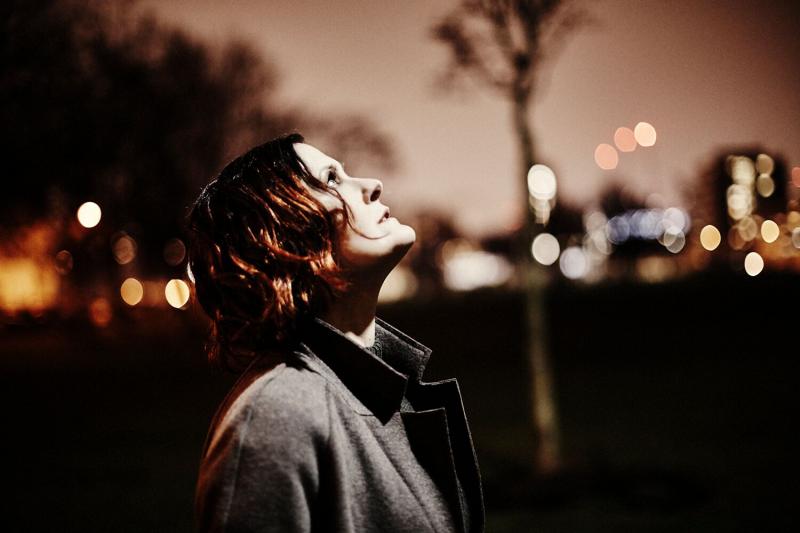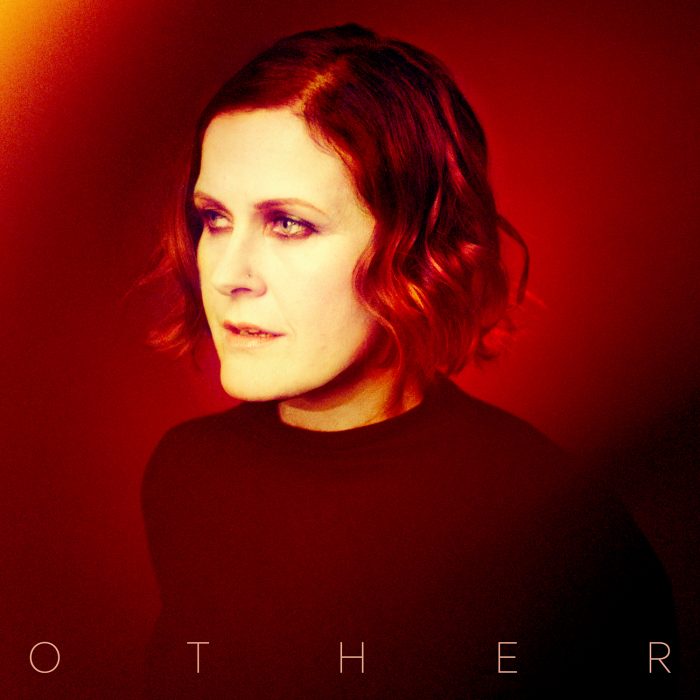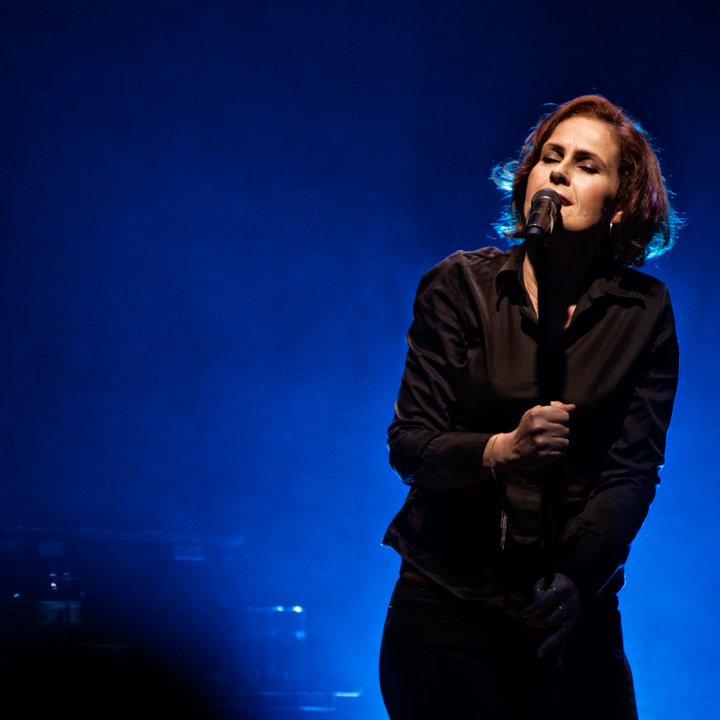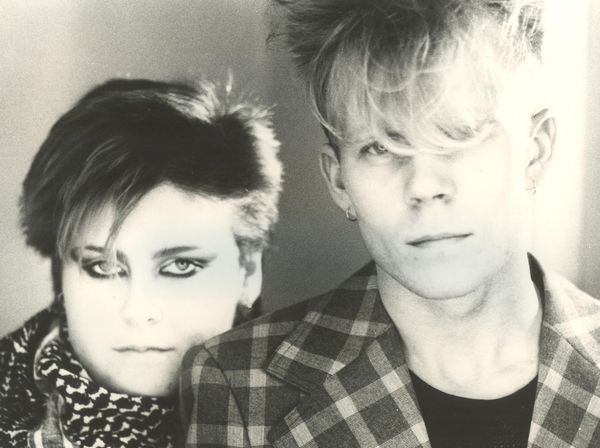theartsdesk Q&A: Musician Alison Moyet | reviews, news & interviews
theartsdesk Q&A: Musician Alison Moyet
theartsdesk Q&A: Musician Alison Moyet
'Alf' talks mortality, people-watching and not living by other people's rules

Alison Moyet is one of Britain's best-loved singer-songwriters. Known for her deep, soulful voice and down-to-earth personality she has managed to combine commercial sensibility with artistic integrity for over 30 years. Today, 16 June, she releases her ninth solo album Other, recorded with long-time collaborator Guy Sigsworth.
Geneviève Alison Jane Moyet was born in Billericay, Essex to a French father and English mother. Her teenage years were spent playing in various punk and garage bands. In 1982 she formed the seminal new wave band Yazoo with former Depeche Mode keyboard player Vince Clarke. Their pioneering electronic sound produced the moody classics "Only You" and "Nobody's Diary".
 In 1984 Moyet turned solo, scoring such hits as "All Cried Out" and "Love Resurrection". Her career dipped a little in the Nineties when a contractual dispute with her label led to a recording hiatus. When not recording, Moyet spent the time expanding her range of musical styles, and in 2001 she successfully took on the role of "Mama" Morton in the West End musical Chicago. But her first love remains pop music, and over the last decade and a half she has released several highly-acclaimed records.
In 1984 Moyet turned solo, scoring such hits as "All Cried Out" and "Love Resurrection". Her career dipped a little in the Nineties when a contractual dispute with her label led to a recording hiatus. When not recording, Moyet spent the time expanding her range of musical styles, and in 2001 she successfully took on the role of "Mama" Morton in the West End musical Chicago. But her first love remains pop music, and over the last decade and a half she has released several highly-acclaimed records.
I meet Moyet in a dive bar just off London's King's Road. It's five in the afternoon and we are practically the only people there. The bar looks like the kind of place that within a couple of hours will be thick with Sloanes. Moyet, by contrast, in a pair of black jeans, sandals, and a plum coloured top, looks disctinctly bohemian. She explains in her broad Basildon accent, that she has just come from her sculpture class.
We chat a little about our respective days. As she discusses college her manner is matey, and relaxed. But when I tell her how I have been suffering with asthma all afternoon, she suddenly seems concerned and offers me a cold glass of water. In person Moyet doesn't just seem unstarry and no-nonsense but also kind and genuine.
As I set up, we talk about some of her recent live performances. The last time I saw her was a couple of years ag at the Royal Festival Hall – a far cry from where she will be next weekend.
RUSS COFFEY: I hear you are going to play the Billy Bragg tent in Glastonbury this year. What's it going to be like, and how do you feel about playing festivals in general?
 ALISON MOYET: I think it's going to be good, it's going to be human. I've played at Glastonbury a few times before. Festivals are always a bit tricky because you don't usually get sound checks and you can't control the sound. But there's also this kind of on-the-edge-of-your-seat feeling, you're in it together and it will be what it'll be.
ALISON MOYET: I think it's going to be good, it's going to be human. I've played at Glastonbury a few times before. Festivals are always a bit tricky because you don't usually get sound checks and you can't control the sound. But there's also this kind of on-the-edge-of-your-seat feeling, you're in it together and it will be what it'll be.
For example, on this tour, although not strictly a festival, we're playing Paris. The French don't get me and that's fair enough. But last time we were there we played some pub or something in the middle of this big tour. There were precious few people, maybe in their tens, but I had such a brilliant time. The people were so engaged with one another. It was the closest I felt to playing a gig when I was 16 again. That thing where you just have to win people. That intimacy and that exchange, it re-energised me.
You have a new album out. Is it fair to say it's diverse with electropop with some dramatic almost theatrical moments?
That's funny. You're not the only person to say theatrical. I don't hear theatrical at all. To me theatrical is something that is planned or staged, and this album was all about improvisation. Guy [Sigsworth, producer] would give me a very basic track and before I even listened to it I'd start to improvise. I would create a melody line without even knowing the chord structure, and so consequently I ended up with melodic lines that have no place in the theatre.
People who know I have been in musical theatre see certain dots and connect them. But I've been in all kinds of places. I've been in punk clubs, I've played with Dr Feelgood, I've been off my face, I've been as sober as a judge, I've been lots of things. I'm nearly 56. I've been many things in my life and I don't think any one thing has informed my work more than anything else.
So how would you characterise the music?
I see it as kind of prog pop. Guy and I work like a band. Everything to do with the vocals is my dominion. Everything to do with the sounds, and the instrumentation, is Guy's dominion. The melodic information and the lyrics are mine. Guy paints around me. He'll give me a foundation which I'll build across and then he'll remove that and repaint.
The part of me that goes 'I like doing scary things' is tempted by Eurovision. The wiser part of me pulls me up sharp
A lot of care has gone into the words on this album – there's even a spoken-word piece – can you elaborate about the lyrical themes?
It's far more about observation. I've come to this stage in my life where the romantic narrative of pop music does not appeal to me. I can't connect with it. I have changed my life utterly in the last five years. I went from living in a country house where you didn't know your neighbour to living in a terraced house in a street with no off-street parking where I've driven only twice in two years.
….down in Brighton?
Yeah, down in Brighton, where diversity rules. The other day I saw an old geezer walking down the street in a complete pink suit and a pink biker's helmet. And I have come to the stage now as a middle aged woman where I am far less noticeable. People have always had something to say about me but I'm now in this brilliant middle-aged place where people don't really notice you and I love it. So that's the basis of the album. It's about empathy, it's about watching.
It seems ironic that you've called the album Other, even though you now live in a community full of "others".
But isn't that the interesting thing? You spend so much time in your youth thinking that these pains that you feel are unique to you, this feeling of disenfranchisement, this inability to communicate, this inability to find your place. You have to get a bit older to understand how all of us feel that trauma to some degree. We just have different masks, and different ways of covering it. So yes, this album is about being other, and I am now living in a town completely inhabited by "others".
Would you say that middle age is your favourite time of life?
Yeah, middle age has been my favourite and most productive age. It's been where I have been my most comfortable and where I have challenged myself far more. If something frightens me then I'll try my hand at it. If something intimidates me, I'll do it. When I was younger I would avoid putting myself in uncomfortable situations. Now I find discomfort quite comforting.
A young Alison Moyet singing "Is This Love"
You recently sang on stage with your youngest daughter, Caitlin. How do your musical tastes compare?
For me, music for me, it's not about consuming. My youngest daughter is a massive music fan, she works in record shops, she sells musical instruments, she buys records every week, her days are about listening to music. Music is like everything in my life – I write poetry, I don't read books; I make sculptures, I don't know any artists; I make music, I don't listen to music. That's kind of me.
Caitlin plays in bands but they tend to be garage or punk bands but she plays drums and she plays bass. She does a bit of backing vocals but she's never cared about being a front person and for her playing in bands is the same as it was for me when I was a kid. It's what you do. It's how you hang out with your mates.
Talking of mates, I notice that Boy George tweeted something nice about your new material. Do you still have many pals from back in the Eighties?
No, I had none. That was the interesting thing. I didn't hang out with any of them. I don't know any of the Eighties bands. I did bump into George a couple of times and he was always very pleasant, but it was literally just bump into. It just so happened that he was really positive when the Minutes album came out. He really got into that, and he invited me to tour with him but then the Culture Club tour got cancelled, so we didn't.
Watch "Other" from Alison Moyet's new album
Do you try not to look backwards?
It's not that I prefer not to look backwards, it's that I just don't. I'm a bit linear like that. I don't really carry memories. If you ask me countries I've been to I'd find it really hard to remember, or at least the cities. I don't know the place I'm in when I am there. I don't carry memories. I'll go to the guy who runs my Facebook page to ask what I've done.
These days many prominent popular artists, such as Adele, come from stage school, back in your day the local comps in Essex seemed to do well in creating music that really resonated with people. Do you think we've lost something by trying to manufacture creativity?
I think we have. Of course going to stage school can have some advantages. Looking at someone like Adele, her first public performance was a honed self-possessed presentation. My first real appearance on a public stage – Top of the Pops – I remember thinking, "Shit, what do I do with my feet? I have no idea how to move." I had to kind of make it up as I went along. I wish I could have had that time in some ways to find out actually what it was I loved doing.
So on one level I think that they are lucky insofar as they know who they are as recording artists before they come out. However, you've only got to look at X Factor and these programmes and they've all got the same fucking coach so how can any of them really [gesticulates]… so yeah, I think something's lost. Some of the dirt is lost. And the proliferation of blue-eyed R'n'B turns has become so great that I actually find it quite hard to sing those melody lines now.
What modern stuff do you listen to?
I don't. I genuinely don't listen to much modern stuff. I think the last album I really liked was Nick Cave's album before last. And I really liked White Chalk, by PJ Harvey. That for me is still modern. I pick up albums very rarely, and that's not to say there's not great music out there.
Do you think there's any reason to suppose popular music might ever get back to the standard of the Seventies and Eighties, when everyone focused around Top of the Pops?
I don't think there is. Of course, you are going to get some people who will seem to prove otherwise. You know, I look at my three kids. My oldest son's a techie and will stream everything and listens to a lot of non-vocal stuff. My middle daughter, and God knows how this happened, she's a massive Eurovision fan. I mean massive. She lives for the key change. This is not something I get at all, but she has true passion for it. And my youngest one, like I say, she's the one that's a big music consumer. She will buy, buy, buy. But on the whole music has been overtaken by the internet.
You wouldn't ever be tempted by Eurovision, would you?
The part of me that goes "I like doing scary things" is tempted by Eurovision. The wiser part of me who knows there is no music form within that I would appreciate, pulls me up sharp.
 Your new song, "Happy Giddy" could almost have been from the Yazoo days (pictured right). Would you ever be tempted to do a whole album in a Yazoo style?
Your new song, "Happy Giddy" could almost have been from the Yazoo days (pictured right). Would you ever be tempted to do a whole album in a Yazoo style?
Yeah, in terms of the album it's probably the most pop but that's because the subject matter is lightweight.
But you are tying Yazoo together because you have these two things, my voice and Vince's programming. If you actually look at the songs the diversity of the actual material is really… other than the instrumentation, the songs come from all over the shop. But if you're asking me if I'd do an album that comes from all over the shop, yes. I think the last time I was really engaged, truly engaged with current music was the Seventies, when albums were made as albums. And that's what I've done with this new one.
You're looking very well and happy at the moment – what keeps you centred?
The complete comfort of my own mortality. I think when you've been around this long this long your career is a sine wave. I've had times when I've been celebrated by all and I've hit other times when I've been derided. Neither of those positions are completely the truth. I think some of my better work has been completely ignored and deemed risible, and some of my best-selling work I find vacuous. You don't have to live by the rules that other people set.
What's your favourite Alison Moyet song?
My favourite song would be too hard to say, but there are some songs on The Turn, for example, which I really, really love. I'd say from Hometime onwards is where I feel I have managed to slough off popular opinion about who I am and the need to be understood. I feel I am now more understood but have less need for it.
You are about to go on an extensive tour. What can we expect?
It's about 58 days, it takes in some of Europe, it takes in a lot of England and the UK, America, Canada, Australia and New Zealand. It's going to be arduous. I know that a lot of the time I will get into the country with a big change in time zone, then a day off before the next gig, and I'm not a spring chicken. Also when I said "yes" to this tour I was training eight times a week, I was as fit as a butcher's dog. Since I've been going to college it's fucked up my exercise time so now I'm not those things.
But I do this because it's what I've done since I was 15. I gig, that's what I do. I enjoy gigging and I'm not intimidated by a small audience nor by a large audience. I give everything I can give. As long as I feel I've done alright then that's alright.
- More New Music reviews on theartsdesk
- Alison Moyet is playing festivals and touring until December 2017
Watch Alison Moyet's new single "Reassuring Pinches"
Explore topics
Share this article
The future of Arts Journalism
You can stop theartsdesk.com closing!
We urgently need financing to survive. Our fundraising drive has thus far raised £49,000 but we need to reach £100,000 or we will be forced to close. Please contribute here: https://gofund.me/c3f6033d
And if you can forward this information to anyone who might assist, we’d be grateful.

Subscribe to theartsdesk.com
Thank you for continuing to read our work on theartsdesk.com. For unlimited access to every article in its entirety, including our archive of more than 15,000 pieces, we're asking for £5 per month or £40 per year. We feel it's a very good deal, and hope you do too.
To take a subscription now simply click here.
And if you're looking for that extra gift for a friend or family member, why not treat them to a theartsdesk.com gift subscription?
more New music
 Moroccan Gnawa comes to Manhattan with 'Saha Gnawa'
Trance and tradition meet Afrofuturism in Manhattan
Moroccan Gnawa comes to Manhattan with 'Saha Gnawa'
Trance and tradition meet Afrofuturism in Manhattan
 Soulwax’s 'All Systems Are Lying' lays down some tasty yet gritty electro-pop
Belgian dancefloor veterans return to the fray with a dark, pop-orientated sound
Soulwax’s 'All Systems Are Lying' lays down some tasty yet gritty electro-pop
Belgian dancefloor veterans return to the fray with a dark, pop-orientated sound
 Music Reissues Weekly: Marc and the Mambas - Three Black Nights Of Little Black Bites
When Marc Almond took time out from Soft Cell
Music Reissues Weekly: Marc and the Mambas - Three Black Nights Of Little Black Bites
When Marc Almond took time out from Soft Cell
 Album: Mobb Deep - Infinite
A solid tribute to a legendary history
Album: Mobb Deep - Infinite
A solid tribute to a legendary history
 Album: Boz Scaggs - Detour
Smooth and soulful standards from an old pro
Album: Boz Scaggs - Detour
Smooth and soulful standards from an old pro
 Emily A. Sprague realises a Japanese dream on 'Cloud Time'
A set of live improvisations that drift in and out of real beauty
Emily A. Sprague realises a Japanese dream on 'Cloud Time'
A set of live improvisations that drift in and out of real beauty
 Trio Da Kali, Milton Court review - Mali masters make the ancient new
Three supreme musicians from Bamako in transcendent mood
Trio Da Kali, Milton Court review - Mali masters make the ancient new
Three supreme musicians from Bamako in transcendent mood
 Hollie Cook's 'Shy Girl' isn't heavyweight but has a summery reggae lilt
Tropical-tinted downtempo pop that's likeable if uneventful
Hollie Cook's 'Shy Girl' isn't heavyweight but has a summery reggae lilt
Tropical-tinted downtempo pop that's likeable if uneventful
 Pop Will Eat Itself's 'Delete Everything' is noisy but patchy
Despite unlovely production, the Eighties/Nineties unit retain rowdy ebullience
Pop Will Eat Itself's 'Delete Everything' is noisy but patchy
Despite unlovely production, the Eighties/Nineties unit retain rowdy ebullience
 Music Reissues Weekly: The Earlies - These Were The Earlies
Lancashire and Texas unite to fashion a 2004 landmark of modern psychedelia
Music Reissues Weekly: The Earlies - These Were The Earlies
Lancashire and Texas unite to fashion a 2004 landmark of modern psychedelia
 Odd times and clunking lines in 'The Life of a Showgirl' for Taylor Swift
A record this weird should be more interesting, surely
Odd times and clunking lines in 'The Life of a Showgirl' for Taylor Swift
A record this weird should be more interesting, surely

Add comment